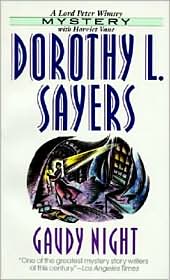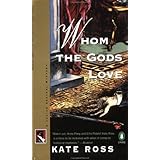I've been especially rough with my mystery collection. For those of you who don't know, my favorite type of book is the mystery novel. I love 'em to death (hee, hee), and my favorites are British mysteries. So into the box went all my Dead End Job mysteries (quite good, but set in present-day Florida), all my Knitting Mysteries (set in Colorado, which is fun, but not very well written), and many others I'd enjoyed, but which didn't meet my re-read criteria. As I looked at my new mystery shelves, it was limited to just a few authors. There were a few odds and ends, but for the most part, my shelves consist of Jasper Fforde (parallel literary world), CJ Box (Wyoming game warden), Agatha Christie (the Queen), Kate Ross (regency detective), Laurie R. King (Sherlock Holmes alive and married), Dorothy L. Sayers (Lord Peter, the Bertie Wooster/Jeeves of detectives), and Ellis Peters (both her medieval and 1940s detectives).
This may seem a bit limited for someone who can't get enough in the mysteries department, but these are classic, re-readable, absolutely beloved books of mine. To illustrate, I decided to give you the scoop about my favorite works by my Big Four Mystery Authors: Sayers, King, Ross, and Peters.

Dorothy L. Sayers: Gaudy Night
My Story: I first purchased this book to read on the flight to Washington, D.C. when I was 16. (This same auspicious trip led my to love of the Apollo project, but I digress.) Ostensibly a Lord Peter Wimsey mystery, it is really a mystery involving Harriet Vane, the woman Peter loves, and her return to her college at Oxford. It is a feminist novel, revolving around the negative reaction these female scholars receive from "real" women. It is passionate, thrilling, and a delightful puzzle. I have read it dozens of times, and I never skip a page.
First Line: "Harriet Vane sat at her writing table and stared into Mecklenburg Square."
 Ellis Peters: A Morbid Taste for Bones
Ellis Peters: A Morbid Taste for BonesMy Story: Ellis Peters' Brother Cadfael mysteries were my first serious mystery love. Brother Cadfael lives in a Benedictine Abbey in the 1100s, an older man who has chosen to be a monk after a lifetime of adventure. In this story, Shrewsbury Abbey has succumbed to the medieval passion for relics, and is headed to Wales to claim the bones of Saint Winifred. As Cadfael is Welsh, he is sent to help translate. Of course, one of the brothers is a bit too saintly himself, and Cadfael must work with the people to help save their saint from being shipped off to England.
First Line: "On the fine, bright morning in early May when the whole sensational affair of the Gwytherin relics may properly be considered to have begun, Brother Cadfael had been up long before Prime, picking out cabbage seedlings before the day was aired, and his thoughts were all on birth, growth and fertility, not at all on graves and reliquaries and violent deaths, whether of saints, sinners or ordinary decent, fallible men like himself."
 Ellis Peters: Fallen Into the Pit
Ellis Peters: Fallen Into the PitMy Thoughts: Yes, Ellis Peters rates two books on my list, because she created two fabulous detectives. Inspector George Felse is the lead detective in Comerford in the 1940s, and what makes him especially interesting is that he is also a caring family man. He doesn't drink or chase women, or seem depressed, unlike many literary detectives. He simply does his job to the best of his ability, and then goes home. His son, Dominic Felse, plays an important role in each book, eventually becoming a bit of a detective himself. I haven't read all of these books, as they are out of print, but I've tracked down quite a few. This, the first in the series, introduced me to a facet of WWII history I was not familiar with--German POWs working on farms in England during the war. Of course, when the war is over and some want to stay, it doesn't end well.
First Line: "'The war ended, and the young men came home, and tried indignantly to fit themselves into old clothes and old habits which proved, on examination, to be both a little threadbare, and on trial to be both cripplingly small for bodies and minds mysteriously grown in absence."
 Laurie R. King: O Jerusalem
Laurie R. King: O JerusalemMy Thoughts: I discovered this fabulous series in high school, and eagerly await each new book. She is the only one of my favorite mystery authors alive and kicking, and for that, I am grateful. She writes a beautifully complex idea--Sherlock Holmes is real, and, in the 1920s, has married a highly intelligent young woman, Mary Russell. They solve crime together. It shouldn't work, but it does. In this novel, they hide out in Palestine, working to solve an issue there. It is an amazing descent into end-of-WWI Palestine, when England controlled it, and the setting and story are linked beautifully together. Of course, Mary dresses up as a bespectacled young man, and as she is a firm feminist, a few hijinks do ensue. She is also Jewish, and a scholar of theology, which leads to many interesting insights.
First Line: "The skiff was black, its gunwales scant inches above the waves."

Kate Ross: Whom the Gods Love
My Thoughts: Kate Ross was one of my newest discoveries, and, sadly, has passed away far too soon. She wrote four perfect, exquisite novels about Julian Kestrel, an intelligent young man masquerading as a dandy during the Regency period of English history. (Early 1800s, for the uninformed.) In this, a very popular young man is killed, and the mystery is concerned more with what we don't know about the victim, than the murderer. If you, like me, adore British mystery, please try to find these sadly out-of-print books.
First Line: "Go through the holly archway, Sir Malcolm's letter had said, then take the long straight path past the church."
No comments:
Post a Comment